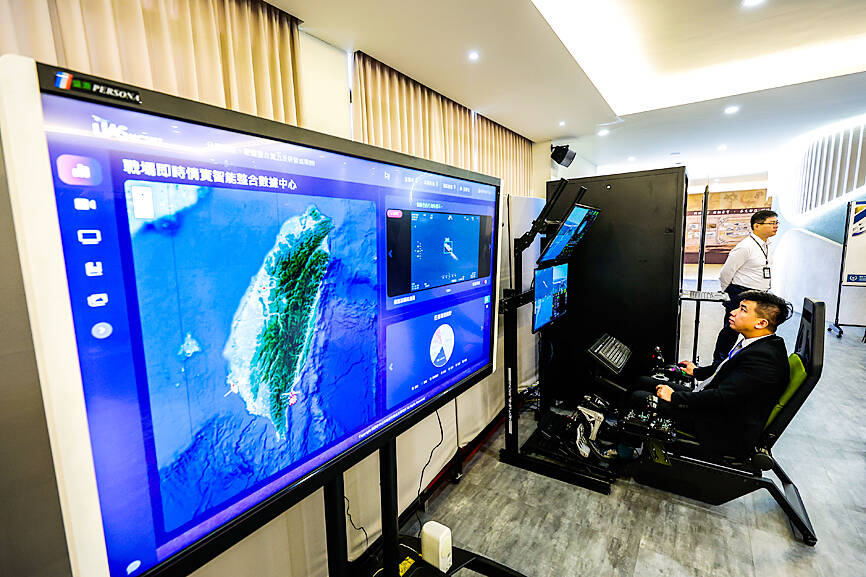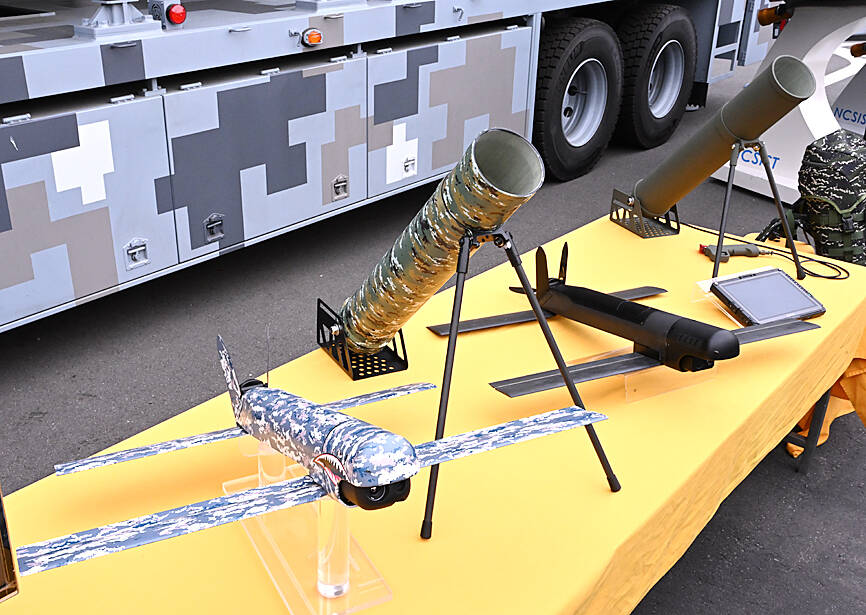The Chungshan Institute of Science and Technology received an order from the navy for a domestically developed exploding drone, the state-owned defense technology research group said yesterday.
The institute is conducting the final certification tests before delivering Loitering Munition 1 to the navy, institute aeronautics systems research division director Yeh Chia-fan (葉嘉範) told a news conference unveiling training simulators in Taichung.
The institute’s Teng Yun 2 (騰雲二型, “Cloud Rider”), Albatross II (銳鳶二型) and Cardinal (紅雀) uncrewed aerial vehicles have been presented to the armed forces after completing all tests, he said, adding that the drone systems are being fielded in batches as the budget permits.

Photo: Ritchie B. Tongo, EPA-EFE
Loitering Munition 1 features an electro-optical infrared camera system, a tablet-based controller and a launcher that uses compressed air, the institute said.
It utilizes a high-explosive warhead and can be deployed against personnel, vehicles and other high-value targets at a range of more than 100km, with a loitering time of 15 minutes, it added.
The institute is developing Loitering Munition 2, an optionally autonomous weapon that uses radar and infrared guidance, and has foldable wings, pods for installation in vehicles and ships, and a hybrid gas-diesel-electric power source.

Photo: Liu Hsin-de, Taipei Times
Speaking on condition of anonymity, a source said the performance of Loitering Munition 1 suggests that the system is intended for use by ground forces, meaning the navy is probably buying the weapons for the Marine Corps.
Loitering Munition 1’s procurement is likely listed in the classified portion of the defense budget, as the nonclassified part contains no reference to it, they said.
Separately, Yeh said the institute has completed eight types of training simulators, including a virtual reality-based system for training remote pilots to perform takeoffs, landings and other skills.
Another drone simulator — designed to train remote pilots and payload operators in advanced tasks — would feature realistic instrument panels, high-definition camera feeds and simulated links with the drone intelligence center, he said.

MAKING WAVES: China’s maritime militia could become a nontraditional threat in war, clogging up shipping lanes to prevent US or Japanese intervention, a report said About 1,900 Chinese ships flying flags of convenience and fishing vessels that participated in China’s military exercises around Taiwan last month and in January have been listed for monitoring, Coast Guard Administration (CGA) Deputy Director-General Hsieh Ching-chin (謝慶欽) said yesterday. Following amendments to the Commercial Port Act (商港法) and the Law of Ships (船舶法) last month, the CGA can designate possible berthing areas or deny ports of call for vessels suspected of loitering around areas where undersea cables can be accessed, Oceans Affairs Council Minister Kuan Bi-ling (管碧玲) said. The list of suspected ships, originally 300, had risen to about 1,900 as

DAREDEVIL: Honnold said it had always been a dream of his to climb Taipei 101, while a Netflix producer said the skyscraper was ‘a real icon of this country’ US climber Alex Honnold yesterday took on Taiwan’s tallest building, becoming the first person to scale Taipei 101 without a rope, harness or safety net. Hundreds of spectators gathered at the base of the 101-story skyscraper to watch Honnold, 40, embark on his daredevil feat, which was also broadcast live on Netflix. Dressed in a red T-shirt and yellow custom-made climbing shoes, Honnold swiftly moved up the southeast face of the glass and steel building. At one point, he stepped onto a platform midway up to wave down at fans and onlookers who were taking photos. People watching from inside

Japan’s strategic alliance with the US would collapse if Tokyo were to turn away from a conflict in Taiwan, Japanese Prime Minister Sanae Takaichi said yesterday, but distanced herself from previous comments that suggested a possible military response in such an event. Takaichi expressed her latest views on a nationally broadcast TV program late on Monday, where an opposition party leader criticized her for igniting tensions with China with the earlier remarks. Ties between Japan and China have sunk to the worst level in years after Takaichi said in November that a hypothetical Chinese attack on Taiwan could bring about a Japanese

The WHO ignored early COVID-19 warnings from Taiwan, US Deputy Secretary of Health and Human Services Jim O’Neill said on Friday, as part of justification for Washington withdrawing from the global health body. US Secretary of State Marco Rubio on Thursday said that the US was pulling out of the UN agency, as it failed to fulfill its responsibilities during the COVID-19 pandemic. The WHO “ignored early COVID warnings from Taiwan in 2019 by pretending Taiwan did not exist, O’Neill wrote on X on Friday, Taiwan time. “It ignored rigorous science and promoted lockdowns.” The US will “continue international coordination on infectious